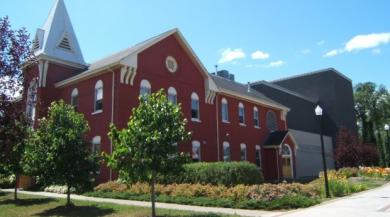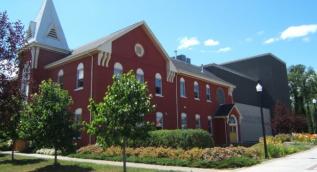
Magnus Theatre
http://www.magnus.on.ca Like this? Login Telephone:
807-345-5552
Address:
Professional Live Theatre
In 1971, British director Burton Lancaster had an idea to create a new theatre company. The idea took root not in New York, Toronto or Montreal, but in a medium-sized North American city with a healthy arts community and no professional theatre to call its own. As the story goes, he closed his eyes and randomly placed his finger on a map of North America and landed on Thunder Bay in the remote wilderness of Northern Ontario.
Magnus Theatre’s home from 1971 – 2001. Rendering by Lila Cano & Michael Dorval.
Once Lancaster arrived, plans for a theatre and the hunt for a venue began. After a few false starts with some old and decrepit buildings, Lancaster stumbled across the Slovakian Hall in the East End of the city. Although it was small and run-down, it had charm, enough space to house the stage and the essential facilities and it was available for rent. Eventually, Lancaster transformed this small hall at 639 McLaughlin Street into the full-fledged professional theatre company that Magnus has become.
There were a few others who shared Burton’s vision and played key roles in the development of Magnus. With the help of Dusty Miller (the first Chair of the Arts and Heritage Committee of Thunder Bay, and former Mayor of Thunder Bay), and Carol Bell, (a former Hillcrest High School drama teacher), a citizen’s coalition was formed. With the efforts of these dedicated people and many others, Magnus Theatre was officially established in 1971. By 1977, it had become the only professional theatre company between Winnipeg and Sudbury, and it was supported by the Canada Council, Ontario Arts Council, the City of Thunder Bay, local businesses, and theatre patrons.
Building upon Lancaster’s initial vision, each successive Artistic Director has taken the Magnus reigns and strengthened the theatre’s local and national profile. From 1977 to 1982, Tibor Feheregyhazi created a community-focused company and built the local audience base for mainstage productions. Following Tibor, Brian Richmond took over from 1982 to1987 and established a high national profile for Magnus by producing new Canadian plays. Other theatres subsequently produced many of these plays across the country, firmly placing Magnus on the Canadian professional theatre map. In 1987, Michael McLaughlin took over and shifted the focus back to the community as he further established the local audience base. McLaughlin also initiated the successful Theatre in Education program to further develop the strong ties that Magnus and the community share.
Current Artistic Director, Mario Crudo, who joined Magnus in 1992, places his focus on the following areas: strengthening and broadening ties with the community, partnerships, generating new interest in mainstage productions, advancing new play development, and solidifying adult regional touring and other outreach programs, he also has a strong commitment to expanding the Theatre in Education program that offers many activities, including drama classes for all ages, touring plays for young audiences, and a summer school for young people. In an effort to make Magnus a year-round operation, he initiated summer mainstage programming.
The new Magnus in the Park! opened in September 2001 after a successful $5.5 million campaign. Rendering by Michael Dorval.
The new Magnus in the Park! opened in September 2001 after a successful $5.5 million campaign. Rendering by Michael Dorval.
In 1998, Magnus received the Lieutenant Governor’s Award for the Arts from the Ontario Arts Council Foundation. The award recognized the Organization’s exceptional private sector and community support. This award certainly justified the dedicated work of the Organization’s management and Board to supplementing the Company’s operating support through innovative sponsorship initiatives and other fundraising campaigns.
Magnus Theatre has established a number of community relationships which include The Thunder Bay Children’s Festival, the Mayor’s Luncheon for the Arts, The Thunder Bay Fringe Festival, Arts Alive Festival, Arts & Heritage Alliance, The Chronicle Journal Arts & Heritage Awards, and Arts Week. The Theatre also shares its resources by renting the facility and costumes to companies for performances, as well as acting as a resource for community theatre companies.
Throughout the theatre’s history, it was obvious that Magnus would eventually outgrow the small hall that had served as its home for so many years, and the need for improved facilities became increasingly apparent. Magnus began its search for a new space in the early-nineties and in 1997 decided to build. Magnus inaugurated its 2001-2002 30th Anniversary Season in a newly built theatre attached to the historic Central School House, which houses Magnus’ administrative offices, in the Waverley Park heritage district.
Magnus today.
Magnus Theatre today, in the Central School historic building.
Magnus Theatre is proud to have the privilege of helping to bring Central School back to life and back to the people of Thunder Bay and Northwestern Ontario. Central School was the first school in the City of Port Arthur. In 1884, two acres of Waverley Park land were granted by the Crown to the Public School Trustees and the original structure was built. For over 80 years the school was filled with the laughter of thousands of school children…many of whom are today’s community leaders. The renovation of the school also included the preservation and enhancement of the Waverley Park Heritage Conservation District.
The vision of Magnus Theatre board members and staff, along with the support and nurturing Magnus receives from individuals and businesses in the community, has made Magnus one of the most successful theatre companies in Canada. The theatre now employs up to 60 artists a year, including actors, directors and designers. Also, in the proud tradition of local support, Magnus has a volunteer base of over 250 individuals, which includes a dedicated and resourceful Board of Directors.
Magnus Theatre’s home from 1971 – 2001. Rendering by Lila Cano & Michael Dorval.
Once Lancaster arrived, plans for a theatre and the hunt for a venue began. After a few false starts with some old and decrepit buildings, Lancaster stumbled across the Slovakian Hall in the East End of the city. Although it was small and run-down, it had charm, enough space to house the stage and the essential facilities and it was available for rent. Eventually, Lancaster transformed this small hall at 639 McLaughlin Street into the full-fledged professional theatre company that Magnus has become.
There were a few others who shared Burton’s vision and played key roles in the development of Magnus. With the help of Dusty Miller (the first Chair of the Arts and Heritage Committee of Thunder Bay, and former Mayor of Thunder Bay), and Carol Bell, (a former Hillcrest High School drama teacher), a citizen’s coalition was formed. With the efforts of these dedicated people and many others, Magnus Theatre was officially established in 1971. By 1977, it had become the only professional theatre company between Winnipeg and Sudbury, and it was supported by the Canada Council, Ontario Arts Council, the City of Thunder Bay, local businesses, and theatre patrons.
Building upon Lancaster’s initial vision, each successive Artistic Director has taken the Magnus reigns and strengthened the theatre’s local and national profile. From 1977 to 1982, Tibor Feheregyhazi created a community-focused company and built the local audience base for mainstage productions. Following Tibor, Brian Richmond took over from 1982 to1987 and established a high national profile for Magnus by producing new Canadian plays. Other theatres subsequently produced many of these plays across the country, firmly placing Magnus on the Canadian professional theatre map. In 1987, Michael McLaughlin took over and shifted the focus back to the community as he further established the local audience base. McLaughlin also initiated the successful Theatre in Education program to further develop the strong ties that Magnus and the community share.
Current Artistic Director, Mario Crudo, who joined Magnus in 1992, places his focus on the following areas: strengthening and broadening ties with the community, partnerships, generating new interest in mainstage productions, advancing new play development, and solidifying adult regional touring and other outreach programs, he also has a strong commitment to expanding the Theatre in Education program that offers many activities, including drama classes for all ages, touring plays for young audiences, and a summer school for young people. In an effort to make Magnus a year-round operation, he initiated summer mainstage programming.
The new Magnus in the Park! opened in September 2001 after a successful $5.5 million campaign. Rendering by Michael Dorval.
The new Magnus in the Park! opened in September 2001 after a successful $5.5 million campaign. Rendering by Michael Dorval.
In 1998, Magnus received the Lieutenant Governor’s Award for the Arts from the Ontario Arts Council Foundation. The award recognized the Organization’s exceptional private sector and community support. This award certainly justified the dedicated work of the Organization’s management and Board to supplementing the Company’s operating support through innovative sponsorship initiatives and other fundraising campaigns.
Magnus Theatre has established a number of community relationships which include The Thunder Bay Children’s Festival, the Mayor’s Luncheon for the Arts, The Thunder Bay Fringe Festival, Arts Alive Festival, Arts & Heritage Alliance, The Chronicle Journal Arts & Heritage Awards, and Arts Week. The Theatre also shares its resources by renting the facility and costumes to companies for performances, as well as acting as a resource for community theatre companies.
Throughout the theatre’s history, it was obvious that Magnus would eventually outgrow the small hall that had served as its home for so many years, and the need for improved facilities became increasingly apparent. Magnus began its search for a new space in the early-nineties and in 1997 decided to build. Magnus inaugurated its 2001-2002 30th Anniversary Season in a newly built theatre attached to the historic Central School House, which houses Magnus’ administrative offices, in the Waverley Park heritage district.
Magnus today.
Magnus Theatre today, in the Central School historic building.
Magnus Theatre is proud to have the privilege of helping to bring Central School back to life and back to the people of Thunder Bay and Northwestern Ontario. Central School was the first school in the City of Port Arthur. In 1884, two acres of Waverley Park land were granted by the Crown to the Public School Trustees and the original structure was built. For over 80 years the school was filled with the laughter of thousands of school children…many of whom are today’s community leaders. The renovation of the school also included the preservation and enhancement of the Waverley Park Heritage Conservation District.
The vision of Magnus Theatre board members and staff, along with the support and nurturing Magnus receives from individuals and businesses in the community, has made Magnus one of the most successful theatre companies in Canada. The theatre now employs up to 60 artists a year, including actors, directors and designers. Also, in the proud tradition of local support, Magnus has a volunteer base of over 250 individuals, which includes a dedicated and resourceful Board of Directors.


 rtraction
rtraction